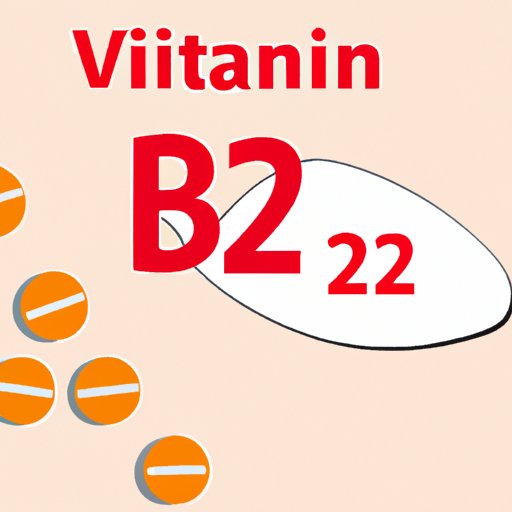
Introduction
Vitamin B12 is an essential nutrient required for proper functioning of the brain and nervous system, as well as the formation of red blood cells. Despite its importance, many people do not consume enough of it, leading to deficiencies with serious consequences. However, it is possible to overdo it on Vitamin B12, which can also lead to health issues. In this article, we will examine how much Vitamin B12 is too much and the potential risks of overconsumption.
Examining the Importance of Vitamin B12
Vitamin B12, also known as cobalamin, is a water-soluble vitamin essential for healthy nerve tissue, brain function, and red blood cell production. The body does not make this vitamin naturally, so it is important to consume it from food sources or supplements.
Many animal-based foods are good sources of Vitamin B12, including meat, eggs, dairy, and seafood. However, it can be difficult for vegetarians and vegans to get enough of it from dietary sources alone. In these cases, supplements may be necessary.
How Much Do You Really Need? A Guide to Vitamin B12 Dosage
The amount of Vitamin B12 required depends on factors such as age, gender, and lifestyle. The recommended daily amount for adults is 2.4 mcg, but this can vary. Pregnant and breastfeeding women may need more, and older adults may require higher doses due to decreased absorption.
Factors that may impact how much Vitamin B12 you need include certain medications, such as proton pump inhibitors or metformin, and certain health conditions that impact absorption, such as Crohn’s disease or celiac disease.
It is important to work with a healthcare provider to determine the appropriate dose for your individual needs.
The Dangers of Too Much Vitamin B12: What You Need to Know
While it is essential to consume enough Vitamin B12, it is possible to consume too much. The risks associated with overconsumption are not as well known as those associated with deficiency, but they are still important to understand.
Excessive intake of Vitamin B12 from supplements can lead to hypervitaminosis, a condition characterized by high levels of the vitamin in the blood. This can cause a range of symptoms, including dizziness, headaches, nausea, and vomiting. Long-term overconsumption has been linked to more serious health issues, such as cardiovascular disease and nerve damage.
It is important to note that excessive intake of Vitamin B12 from dietary sources is rare, as the body excretes any excess through urine. This is why supplements are the most common cause of hypervitaminosis.
Signs and Symptoms of Excessive B12 Intake
The signs and symptoms of excessive Vitamin B12 intake can vary depending on the individual. Some of the most common indicators include:
- Dizziness
- Headaches
- Nausea
- Vomiting
- Difficulty sleeping
- Anxiety
- Skin rash
- Heart palpitations
It’s important to note that these symptoms can also be present in other health conditions, so it’s essential to work with a healthcare provider to determine the cause of these symptoms.
Finding the Right Balance: How to Avoid Both Deficiency and Toxicity
To ensure you are getting enough Vitamin B12 without overdoing it, it’s essential to incorporate dietary sources into your diet. Good sources include meat, fish, dairy, eggs, and fortified cereals.
It’s also important to consider lifestyle factors that can impact your ability to absorb and metabolize Vitamin B12. For example, heavy drinking and smoking can negatively impact absorption.
If you are concerned about your Vitamin B12 intake, consult a healthcare provider. They can determine your individual needs and recommend a safe level of supplementation.
Dietary Sources of Vitamin B12 and the Implications of Excessive Supplementation
As previously mentioned, incorporating dietary sources of Vitamin B12 into your diet is an excellent way to ensure you are getting enough without relying on supplements.
It’s also important to note that excessive supplementation can have negative implications. Aside from the previously mentioned risks, Vitamin B12 supplements can interfere with certain medications, causing adverse reactions and interactions. Therefore, it’s important to always speak with a healthcare provider before beginning any supplementation regimen.
Conclusion
Vitamin B12 is essential for optimal health, and it is critical to consume enough of it. However, excessive consumption can lead to a range of health issues. By incorporating dietary sources into your diet and working with a healthcare provider to determine your individual needs, you can ensure you are getting the right dose of Vitamin B12 while avoiding toxicity.
Speak with a healthcare provider if you have concerns about your Vitamin B12 intake.




